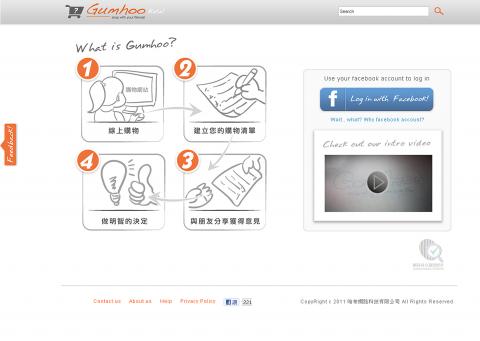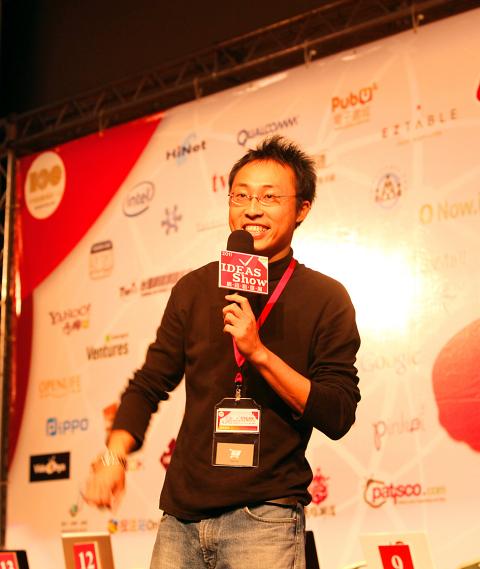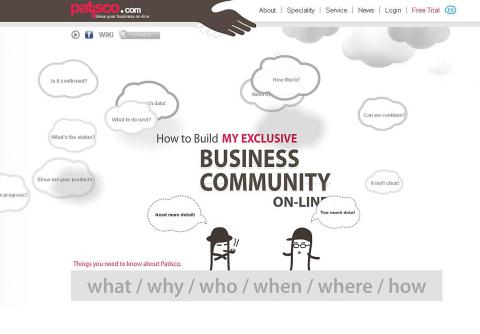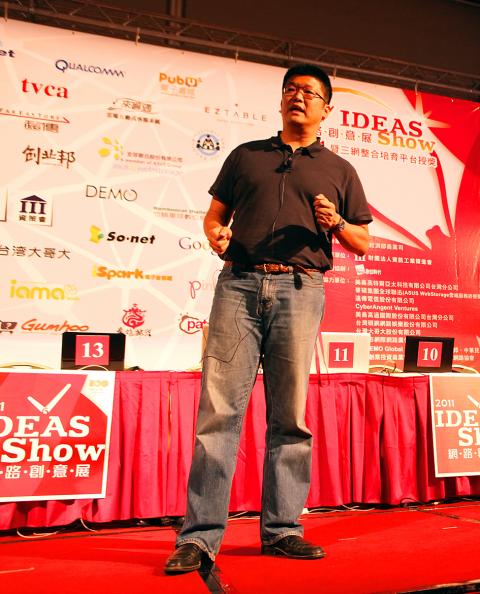Two start-ups, social shopping site Gumhoo and business-to-business platform Patisco, lent a Taiwanese presence to DEMO Fall, which took place earlier this week in Santa Clara, California. The biannual event, one of the top launchpads for emerging technology, is based in Silicon Valley. Previous participants from this country have included Atlaspost (地圖日記), which was purchased by Groupon in December. Gumhoo and Patisco were the first Taiwanese start-ups to present at the show since fall 2009. While neither won any prizes, Gumhoo caught the eye of Intel Capital, Intel Corporation’s investment arm, and Procter and Gamble has expressed an interest in using Patisco, says James Hill, an associate planner with III, of the Institute for Information Industry (III, 財團法人資訊工業策進會) IDEAS Institute, the Web start-up incubator that nominated both companies for the event. For more information about Gumhoo and Patisco, read on.
Gumhoo: Window-shopPING the Internet
Founder Taiku “TK” Chen (陳泰谷) envisions Gumhoo as a “universal shopping cart” that will give users a quick, easy way to reach out to friends for straightforward feedback about items.

Photo: Taipei Times and courtesy of Institute for Information Industry
The inspiration for Gumhoo (the name is a play on the Hoklo (commonly known as Taiwanese) for “is it good?”) came to Chen when he stumbled upon a jacket while out shopping.
“It was on sale and I wanted to buy it, but I couldn’t make a decision,” he says. “I thought sending a text message, e-mail or sharing it on Facebook were all too bothersome. There wasn’t a quick service.”
After logging onto the Web site with their Facebook accounts, users can install a button onto their Web site browser’s bookmark bar to use while browsing online stores. Gumhoo also has an iPhone app that allows users to take a quick snapshot of desired products in stores. Users are given the option of creating private or public lists with their items. Friends can give their opinion by hitting two buttons — “get it” or “hold.”

Photo: Taipei Times and courtesy of Institute for Information Industry
Gumhoo is still in its infancy — it went live in June and has about 400 users — but Chen has big plans for the Web site, which he hopes will hit 5,000 users by the end of this year. The Web site is currently funded by one angel investor (Chen’s father) but the company plans to start raising seed money after DEMO Fall.
In addition to the Taiwanese market, Chen wants to expand Gumhoo to the US, where he studied for two years. There, Gumhoo will compete against social shopping sites like Kaboodle (www.kaboodle.com) and Amazon.com’s wish lists.
Chen says that Gumhoo stands out because of its ease of use and privacy controls. He and his four-member team are currently deliberating adding functions like pricing comparison, a drag-and-drop interface to organize lists and a barcode scanner for smartphones.

Photo: Taipei Times and courtesy of Institute for Information Industry
“Our goal is to make a product that really helps people connect with friends while shopping and has the tools to help them make purchasing decisions,” says Chen.
Chen envisions users sharing their lists with small groups of about three to five friends. The Web site’s target demographic is women in their 20s to 40s, but Gumhoo also markets itself as a tool for families organizing their grocery lists, couples creating a wedding registry or friends looking for supplies while party planning.
The Gumhoo team hopes to develop partnerships with e-commerce sites like PayEasy (www.payeasy.com.tw) and Fashion Guide (www.fashionguide.com.tw). Online stores can embed a Gumhoo button onto their Web sites in exchange for demographic data and analytics that show which items are “Gumhooed” the most and how users vote on them. (Chen says the information will only be made available from lists users choose to make public).

Photo: Taipei Times and courtesy of Institute for Information Industry
For more information, visit www.gumhoo.com
Patisco: Connecting suppliers and their customers
Patisco is a cloud-based business-to-business platform that seeks to make life easier for suppliers, middlemen and clients.
Founder Even Chung (鍾亦恒) created Patisco after 15 years working for his family’s company, which sells bicycle parts to clients in Europe and Japan. Chung also spent seven years exporting textiles, consumer electronic components and GPS navigation systems.
Chung says all his trading experience has given him plenty of opportunities to see how things can go wrong. For example, he says a tiny omission in an e-mail sent by an assistant once cost him a chunk of revenue.
“My office lady thought she didn’t have to describe one detail of a component. She skipped just one line, but that one line cost me NT$500,000,” says Chung.
“I’ve realized that the essence of trading is pretty much the same: good communication, good relationships and good vision,” he adds.
Chung, who has spent four years developing Patisco and invested NT$10 million in the start-up, says its aim is to offer an alternative to e-mail by streamlining information and communication management. He hopes those features will help it compete against China-based Alibaba (www.alibaba.com), which focuses on keyword searches and advertisements.
“I was a heavy user of Alibaba and it was very troublesome for me. I put products on it and every day I would receive 20 to 30 inquiries from around the world,” says Chung.
Sending production and pricing information via individual e-mails was “time consuming and not productive,” he adds.
Patisco’s user interface allows suppliers and their customers to view several streams of information at once, including all correspondence related to an order, prototype sketches and product specifications. Companies can create comparison charts for items from different suppliers, ask for adjustments and negotiate prices. Supervisors are given the option of signing off on messages before they are sent. All data related to an order or project is automatically organized into files for archiving.
Patisco currently has about 270 companies using the platform on a trial basis. Though about half of those businesses are based in China, Chung envisions Patisco first expanding with paid licensees in Taiwan before moving on to English-speaking countries.
“A lot of people see us as a supply chain management platform, while suppliers see us as CRM [customer relationship management],” says Chung of Patisco’s software, which is patented in Taiwan. “But so far I haven’t really seen anyone putting the two things together and trying to make a harmonic connection between them.”
For more information, visit www.patisco.com

March 10 to March 16 Although it failed to become popular, March of the Black Cats (烏貓進行曲) was the first Taiwanese record to have “pop song” printed on the label. Released in March 1929 under Eagle Records, a subsidiary of the Japanese-owned Columbia Records, the Hoklo (commonly known as Taiwanese) lyrics followed the traditional seven characters per verse of Taiwanese opera, but the instrumentation was Western, performed by Eagle’s in-house orchestra. The singer was entertainer Chiu-chan (秋蟾). In fact, a cover of a Xiamen folk song by Chiu-chan released around the same time, Plum Widow Missing Her Husband (雪梅思君), enjoyed more

Last week Elbridge Colby, US President Donald Trump’s nominee for under secretary of defense for policy, a key advisory position, said in his Senate confirmation hearing that Taiwan defense spending should be 10 percent of GDP “at least something in that ballpark, really focused on their defense.” He added: “So we need to properly incentivize them.” Much commentary focused on the 10 percent figure, and rightly so. Colby is not wrong in one respect — Taiwan does need to spend more. But the steady escalation in the proportion of GDP from 3 percent to 5 percent to 10 percent that advocates

From insomniacs to party-goers, doting couples, tired paramedics and Johannesburg’s golden youth, The Pantry, a petrol station doubling as a gourmet deli, has become unmissable on the nightlife scene of South Africa’s biggest city. Open 24 hours a day, the establishment which opened three years ago is a haven for revelers looking for a midnight snack to sober up after the bars and nightclubs close at 2am or 5am. “Believe me, we see it all here,” sighs a cashier. Before the curtains open on Johannesburg’s infamous party scene, the evening gets off to a gentle start. On a Friday at around 6pm,

A series of dramatic news items dropped last month that shed light on Chinese Communist Party (CCP) attitudes towards three candidates for last year’s presidential election: Taiwan People’s Party (TPP) founder Ko Wen-je (柯文哲), Terry Gou (郭台銘), founder of Hon Hai Precision Industry Co (鴻海精密), also known as Foxconn Technology Group (富士康科技集團), and New Taipei City Mayor Hou You-yi (侯友宜) of the Chinese Nationalist Party (KMT). It also revealed deep blue support for Ko and Gou from inside the KMT, how they interacted with the CCP and alleged election interference involving NT$100 million (US$3.05 million) or more raised by the